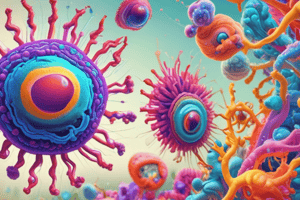Podcast
Questions and Answers
कोशिकाएँ किसके समानित जाती हैं?
कोशिकाएँ किसके समानित जाती हैं?
- छोटे कारखानों
- छोटे फैक्ट्रियों (correct)
- जानवरों
- मिट्टी
DNA किसके बारे में जानकारी धारित करता है?
DNA किसके बारे में जानकारी धारित करता है?
- विकास
- समुद्री प्रदूषण
- व्यवहार
- संतान (correct)
पारिस्थितिकी में क्या प्रमुख भूमिका होती है?
पारिस्थितिकी में क्या प्रमुख भूमिका होती है?
- मनुष्य
- समुद्री जीवन
- पेड़-पौधे (correct)
- प्रकाश
मिटोकॉन्ड्रिया में क्या रहता है?
मिटोकॉन्ड्रिया में क्या रहता है?
वनस्पतियों की प्रजातियाँ बदलने की प्रक्रिया किसे कहलाती है?
वनस्पतियों की प्रजातियाँ बदलने की प्रक्रिया किसे कहलाती है?
किस की नामकरण विज्ञान समूहीकरण के लिए महत्वपूर्ण है?
किस की नामकरण विज्ञान समूहीकरण के लिए महत्वपूर्ण है?
किस प्रमुख प्रक्रिया से पुरानी मृत प्राणियों के अवशेष मिलते हैं?
किस प्रमुख प्रक्रिया से पुरानी मृत प्राणियों के अवशेष मिलते हैं?
किस तकनीक का उपयोग करके शोधकर्ता सेल, ऊतक, और जीवों के कार्यों में प्रवेश करते हैं?
किस तकनीक का उपयोग करके शोधकर्ता सेल, ऊतक, और जीवों के कार्यों में प्रवेश करते हैं?
किस प्रक्रिया के माध्यम से नई प्रजाति में परिवर्तन का समर्थन किया गया है?
किस प्रक्रिया के माध्यम से नई प्रजाति में परिवर्तन का समर्थन किया गया है?
कौन-सा प्रौद्योगिकी सुसम्पूर्ण इनमंुस्कुलेशन, CRISPR-Cas9 प्रौद्योगिकी, और बायो-सूचना-प्रौद्योगिकि है?
कौन-सा प्रौद्योगिकी सुसम्पूर्ण इनमंुस्कुलेशन, CRISPR-Cas9 प्रौद्योगिकी, और बायो-सूचना-प्रौद्योगिकि है?
Study Notes
Jumping into Biology: A Peek at the Science Side
Biology—the intricate dance of life, from microscopic cells to sprawling ecosystems—offers a fascinating world to explore. As we dive into this subtopic of science, let's take a moment to appreciate the interwoven complexities that define life on Earth.
The Building Blocks of Life: Cells
Cells, the fundamental units of life, are often compared to tiny factories. Each cell contains specialized structures and organelles that enable its various functions. Take, for example, the mitochondria, the powerhouses of cells, which convert chemical energy into adenosine triphosphate (ATP), the "energy currency" of living organisms.
The Language of Life: Genetics
In the mid-20th century, biologists discovered the secrets of heredity with the elucidation of DNA's structure and its role in encoding genetic information. DNA carries the instructions for an organism's development, behavior, and reproduction. The double helix, the iconic image representing DNA, is a testament to the beauty and complexity of life.
The Web of Life: Ecology
Ecology, the study of interactions among organisms and their environment, offers a macro perspective on life. Ecosystems are diverse and dynamic, with each living thing playing a specific role in maintaining balance and sustainability. Biogeochemical cycles, such as the carbon cycle, are crucial to understanding the interactions among organisms, their environment, and the Earth's resources.
The Solutions to Life's Mysteries: Evolution
Evolution, the process by which species change over time, is another core concept in biology. Darwin's theory of natural selection, combined with the mechanisms of mutation and genetic drift, explain the emergence of new species and the diversity of life on Earth. Fossils, anatomical structures, and DNA sequences all offer evidence that supports the theory of evolution.
The Puzzle of Life: Taxonomy
Biologists rely on taxonomy, the science of classification, to organize living things into a logical framework that helps us understand their relationships and evolutionary history. Linnaeus's binomial nomenclature, assigning each species a two-part name (genus and species), is a cornerstone of modern taxonomy.
The Study of Life: Methods of Biology
Biologists employ a wide range of methods to study life, from molecular techniques to field observations. Researchers often use microscopy, molecular biology, genetics, and biotechnology to probe the workings of cells, tissues, and organisms. Ecologists, on the other hand, might use remote sensing, population dynamics, and ecosystem modeling to study patterns and processes in natural systems.
The Future of Biology: Technological Advances
As with any scientific discipline, technological advancements continue to revolutionize biology. High-throughput sequencing, CRISPR-Cas9 technology, and bioinformatics tools have transformed biological research, allowing scientists to delve deeper into life's mysteries and tackle complex challenges like climate change and disease prevention.
Biology is a vast and continuously evolving field that encompasses the wonders of life on Earth. From the intricate chemistry of cells to the mesmerizing patterns of ecosystems, biology offers a frontier full of discovery, wonder, and opportunity. Like any science, it requires an open mind, a curious spirit, and a strong desire to understand the world around us.
Studying That Suits You
Use AI to generate personalized quizzes and flashcards to suit your learning preferences.
Description
Dive into the intricate world of biology, from the building blocks of life in cells to the study of genetics, ecology, evolution, taxonomy, and more. Discover the methods and technological advances shaping the future of biological research.



